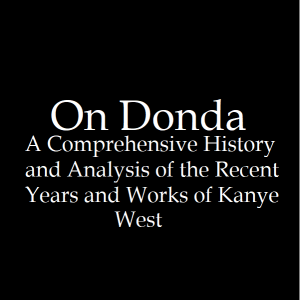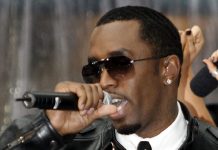 As many Kanye West records before this one, Donda is a mixed bag. With a 27-track, 108-minute runtime, every moment of the record isn’t expected to be amazing front-to-back, however, and the result is generally to the record’s credit. Showcasing some of West’s hardest beats, beautiful compositions and killer features, Donda is surprisingly consistent. Beginning the record with the hauntingly simple “Donda Chant,” West establishes a short, haunting theme that becomes of central importance to the next hour and forty-five minutes. Bangers then lead the record, with the run of “Jail,” “God Breathed,” “Off The Grid,” and “Hurricane” serving as some of the best modern solo Kanye tracks. “Jail” is powerful follow-up to the chant, with deceivingly simple instrumentation that crescendos the five-minute track excellently, and serves both West’s own vocals as well as Jay-Z’s feature on the cut, one of his best in years. “God Breathed” turns the tone turgid, with an ominous, atmosphere established by Kanye’s repeated vocal and the deep choir behind the thumping modern bassline. This track also introduces Vory, who serves throughout the album as one of the more interesting features, providing variety and depth to the otherwise Kanye-driven show.
As many Kanye West records before this one, Donda is a mixed bag. With a 27-track, 108-minute runtime, every moment of the record isn’t expected to be amazing front-to-back, however, and the result is generally to the record’s credit. Showcasing some of West’s hardest beats, beautiful compositions and killer features, Donda is surprisingly consistent. Beginning the record with the hauntingly simple “Donda Chant,” West establishes a short, haunting theme that becomes of central importance to the next hour and forty-five minutes. Bangers then lead the record, with the run of “Jail,” “God Breathed,” “Off The Grid,” and “Hurricane” serving as some of the best modern solo Kanye tracks. “Jail” is powerful follow-up to the chant, with deceivingly simple instrumentation that crescendos the five-minute track excellently, and serves both West’s own vocals as well as Jay-Z’s feature on the cut, one of his best in years. “God Breathed” turns the tone turgid, with an ominous, atmosphere established by Kanye’s repeated vocal and the deep choir behind the thumping modern bassline. This track also introduces Vory, who serves throughout the album as one of the more interesting features, providing variety and depth to the otherwise Kanye-driven show.
“Off the Grid” is the standout banger on the record, punching with a hard-hitting drill beat, which serves the incredible performances from Kanye and his features, trap badboy Playboy Carti and drill king Fivio Foreign. We also notice West’s return to censoring explicit lines in his songs, which he has stated is part of his reconciliation with Christianity. Carti particularly shines on his verses, delivering energetic and aggressive flows on-brand for the A$AP Mob member, but Foreign’s lengthy verse is also extremely well composed, highlighting the relative newcomer’s intense flow and performance. Kanye himself has a couple good bars, and his performance is aggressive enough for the veteran. The following ballad, “Hurricane,” led by an incredible gospel-inspired vocal performance from R&B superstar The Weeknd, showcases an unexpected gem from Lil Baby, whose chaotic and raw trap vocal balances great against the airy, groove-laden beat. The synth flourishes in the latter half of the track add to the divine theming of the record, and overlaps Kanye’s self-reflective bars about his fame and personal life during his success.
This a-side is arguably the strongest suit of the record, but the approaching mid-point manages to showcase some nice performances and interesting ideas. “Praise God” is the closest thing to a trap banger on the record, with appropriate Baby Keem and Travis Scott features to show for it (the latter’s verse is fire). “Jonah” showcases another amazing vocal performance from Vory, sporting the choral vocal and a verse of his own. Little Durk precedes Kanye, and while providing a well-performed verse, the personalities in both other cases easily eclipse Durk’s part. The lowkey track vibes hard, and provides excellent space for West’s storytelling.
Fivio Foreign returns on “Ok Ok,” providing memorable ad-libs on Kanye’s first verse on the Lil Yachty & Rooga supported cut. Brooding, intense, yet still simple, this track showcases ok features on an ok beat. “Junya” is the next best track, with Playboy Carti returning over what sounds like a Whole Lotta Red b-side named after Japanese fashion designer Junya Watanabe transitioned into a Kanye track. Its memorable, but brief, and provides a nice transitionary banger into the last section of the first half.
“Believe What I Say” is the first solo Kanye track on the record, and harkens back to his older feel, with bombastic beats and loads of sampling. Kanye’s singing also shows its head, to some extent, and is a great first look at the vocalist’s improved chops.”24” continues the excellence, showcasing the first inclusion of Kanye’s Sunday Service Choir, whose backing gospel provides a serene backdrop for Kanye’s emotive and woeful hymns. The song is rather short, but manages to capture the shaken feelings West expresses well. Unfortunately, the next track kills this vibe. “Remote Control” is an alright tune, but Kanye’s choral melody is relatively annoying, for its awkward, almost whiny nasal tone. Originally featuring Soulja Boy, the released version of Donda shows Young Thug as the only collaborator to the track, who does a passable saving the boring beat. This cut, humorously however, includes a sample from one of the world’s most interesting rabbit holes, Sawinsky and the Mysterious House, a Christian CGI short film turned internet meme.
The bangers return swiftly, however, as “Moon” and “Heaven and Hell” quickly wrap up the first half of Donda with an extremely memorable bow. With a choral feature from Don Toliver and verse sharing with Kid Cudi, “Moon’s” delicate balladry leaves a lingering mellowness despite its short track length, with great vocal chops to each performer, whose lines eventually intertwine to close the tune. With a mere electric guitar for instrumentation, this track sticks out as one of the best on display here. “Heaven and Hell” flips this mood, starting the intense solo cut with a sample from a 1975 20th Century Steel Band track. Kanye raps a lengthy verse, pulling comparisons between his faith and racial tension in the US. Both of these tracks are great, but are unfortunately short-lived among the track list, and tend to fade from memory as the next thirteen tracks unfold.
The title track on Donda serves somewhat as an interlude/thematic piece to the record, with little music (only bookending the cut) within the 2-minute track, and as mentioned earlier, features a speech from Kanye’s late mother. This is followed by a chorus from the Sunday Service Choir and “The World Famous” Tony Williams, Kanye’s cousin, that explodes from the relativesilence, but quickly retreats into the sudden, staccato piano backtrack as Donda finishes her speech. Following this is “Keep My Spirit Alive,” which serves as an ok mellow track, with decent features from Westside Gunn, Conway The Machine, KayyCyy, and even Royce da 5’9”, but it fails to hold a candle to some of the far more experimental and interesting songs before it. After this is the epic “Jesus Lord,” a nearly 9-minute storytelling track matched with a simple but holy beat. With a competent but somewhat off-topic feature from Jay Electronica, the interesting aspect of this track comes from a recording to Kanye from Larry Hoover Jr, the son of the founder of Chicago street gang the Gangster Disciples, whose pardon West vied for upon his visit to the Oval Office under Trump. The track builds to this sample, and establishes an ominous atmosphere that demands the attention of the listener, which is commendable for the record’s production team.
“New Again” is an electronic driven gospel track that is somewhat vapid, but is undeniably groovy. Welcoming the return of the Sunday Service Choir, whose repeated refrain becomes the central and immediately grabbing aspect of the cut, it also beckons the return of another unfortunate collaborator in the Kanye West canon: Chris Brown. Despite his short inclusion on the track, Kanye dominates with quick rhymes and alright bars. The last third of the track is strange however, as the instrumentation cuts out, returning after several a-capelan repetitions of ‘Make me new again!’ to finish off the song close to how it started. The oddity stays with the shortest song on the record, “Tell the Vision,” which seem to be leftover Pop Smoke stems from a session with Kanye. As a tribute, this track is non-functional, barely showcases the late musician’s talents, and feeling extremely out-of-touch and out-of-tune for the record as a wholr.
Albeit short, “Lord I Need You” has a beautiful refrain, and while Kanye rapping about his marriage with Kim Kardashian is a tried and true, it is as functional here as it generally is. This somber and otherwise reflective energy is struck from any record though, and “Pure Souls” shows the first collab between Roddy Rich and our subject. Vapid, bland and otherwise forgettable, this song feels like every party trap banger produced in the last four years. The extended outro from Shenseea is easily the highlight of this track, but feels otherwise disjointed from the cut.
While there are six more tracks on Donda, the final four are reworkings and extended/altered versions of earlier tracks (“Jail pt 2,” “Ok Ok pt 2,” “Junya pt 2,” and “Jesus Lord pt 2”), and will therefore be discussed at limited capacity. The last two tracks, then, are some of the most poignant and important on the record. Beginning with “Come to Life,” this track boasts some of Kanye’s best singing of his career, while ethereal synths climb to the heavens as samples from Christian congregations chaoticly erupt in the background. As the key’s climb in pitch, do Kanye’s vocals, and stunning piano arpeggios thrust to emotive heights that hit an impressive catharsis. As the closest thing to calculated songwriting on this release, this track is left ingrained in the listeners mind for its emotional heights and great performance. Finally, “No Child Left Behind,” concludes the formal record, and as Vory’s short verse hails God, Kanye proclaims that “he’s done miracles on” [him], the record concludes with a thoughtful and light synth passage, leaving a whimsical and bright ending to this monolithic project.
As stated before, Donda is a true amalgamation of modern Kanye. For emotional resonance and messaging, the record, like Kanye’s outward belief system, is passionate, occasionally confusing but ultimately surface-level. It has many of Kanye West’s modern highlights, but is also bloated with filler, sloppily thrown together and still likely unfinished. West has already readded “Jail pt 2 (featuring DaBaby and Marilyn Manson)” to the official track list (as it was not among those released by Universal Music on August 29th), and likely, as with The Life of Pablo, an updated and reworked track list are likely in West’s future release schedule. As that 2016 record was the chimeric brood of his previous work, Donda is another version of such, and due to context surrounding both of the releases and their respective production cycles, it is understandable that the impactful records of Kanye are those he garners some of the most controversy around.
5 years later, however, it is important to discuss Kanye and his impact on the music industry as a whole, and addressing some of the criticisms that should be addressed in contextualizing Donda. For much of his popularity, Kanye has played a forgivable goof; stepping on artists toes, being too invested in his own artistry, causing nonsense beef, and releasing edgy but harmless music. The last few years have been rather telling for the artist however, as his affiliations and actions have spoke louder than his music. In direct relation to Donda, one can look to the recent controversy of the inclusion of “Jail pt 2,” and the collaborators associated with this track. Manson’s numerous allegations have been inflated by heart-wrenching testimonies and a plethora of lawsuits, earning him rightful scorn from the music industry at large, as has DaBaby for his “misinformed comments about HIV/AIDS” (DaBaby, Instagram 2021) at Rolling Loud Miami.
But while much hate can be directed towards the source, the platform which both were presented upon should be criticized. West could have brought the two on under the impression that ‘all press is good press,’ or he could truly sympathize with the artists through their ‘plights’. One can’t know for certain, but it can be argued that these individuals should not have this platform in the first place, especially surrounding the relativity of their transgressions. In this case however, one would also have to criticize others Kanye has worked with recently, and long ago. Chris Brown, another collaborator on Donda, comes to mind for his numerous assaults against women, including his guilty plea in the case regarding Barbados R&B queen Rihanna, and again the lens points to DaBaby, who in 2020 assaulted a fan before a show in Tampa, FL. Kanye should not give a platform to those who have been outwardly forgiven by the music industry, allowing them to retain their fame and stardom, regardless of their actions outside of their art, but neither should the industry at large idolize and support problematic artists. This extends to West himself, as his controversial statements against many have landed him in hot water with the media, only to propel his fame to new heights, landing us here, at Donda.
This is, of course, in addition to Kanye’s own beliefs, and personal affiliations highlighted in media previously, and along his own political career. While his association with the former POTUS turned many heads, West’s own campaign was the sight of controversy, as West stands against abortion and contraceptive rights, and whose words have been praised by pro-life organizations and conservative media outlets alike. More controversy came for Kanye when he attacked the welfare system for contribution to the increased incarceration of black Americans, which he claimed was being used by the United States Democratic Party “to take the fathers out the home and promote welfare.” (West, Saturday Night Live 2018).
This, however, is old news. West’s ability to constantly divert and change media attention from negative aspects of his artistry and associations is impressive, and explains why Donda still broke streaming records on Apple Music and Spotify within it’s 24-hour release window. Kanye’s career to this point has been one of legend, spanning now more than 20 years in the music industry, and the psyche of the music-consuming public. But this behavior cannot continue. No mainstream artist should be able to problematically hold their position as an A-list celebrity while delaying two major releases (both of which were/still remain unfinished), scrapping numerous projects with expectations and commitments made to them, and actively promoting precarious individuals within his own music and platform. Yet Kanye West has.
Without even mentioning the issues with releasing an unfinished, 27-track record as a mainstream pop artist (click this for an article somewhat related to this!), the production process for Donda was fruitless for many, including those whose features were cut from the final product. Soulja Boy, among others, has expressed disproval and frustration with West over social media, causing even more drama between him and former collaborators. Yet West’s release cannot be discussed without the context of competition with Drake, whose recent release Certified Lover Boy played heavily into the release of Kanye’s record, both in its placement for release date, but also in its subsequent performance, as CLB has since eclipsed Donda’s one-day streaming records, causing more fury between the musical giants (releasing unreleased tracks in spite, roasting in tracks, etc.).
But Donda, at least seems to be an incredibly important release for Kanye as a musician, and a man. His recent struggles in his marriage, the loss of his mother, and his recent reconciliation with faith have brought West into the spotlight as a, rightfully so, troubled artist. His image is relatable, admirable, and to some, votable. Yet all of the Kanye West dramas, controversies, and even albums are riddled with unfortunate circumstances, chaotic processes, and passionate artistry, and it reveals how an artist like this retains an increasingly devoted fanbase for their music, but this cannot be explored to a full extent here. Donda finds itself as an enigmatic beast, surrounded in strife, rewrites and an incredible legacy; its hard to assess a record as divisive, personal, and otherwise important as this one is, but with any luck, the legacy of Kanye West and Donda is on full-display, eager for how the world will respond next.
Final Rating: “Who you know spend an hour in Walgreens, huh?”
Favorite Tracks: “Off the Grid,” “Moon,” “Come to Life”
FFO: C’mon, it’s Kanye



















